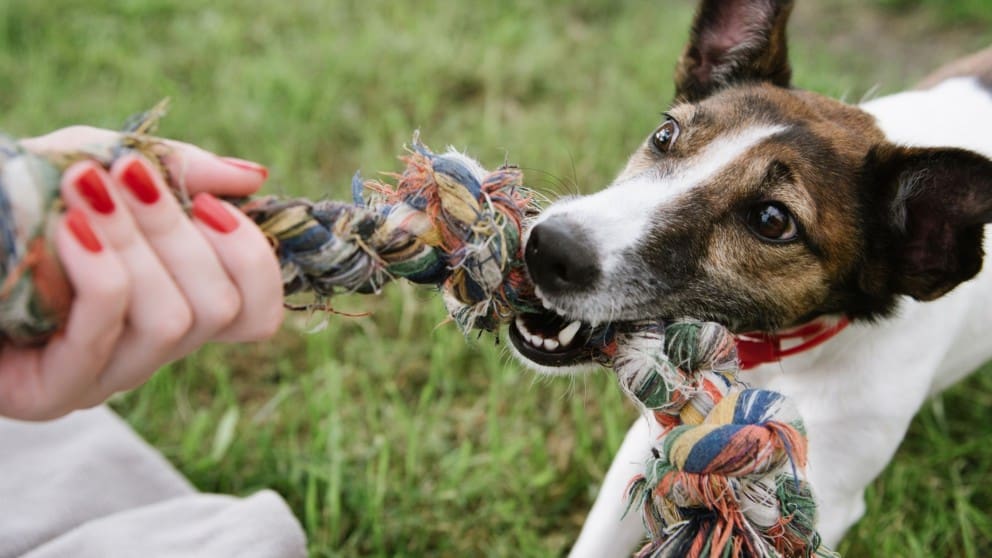Dog Weight Loss & Dog Fitness

Has your vet mentioned that your pet is a tad overweight for its breed? You’re not alone. Most dogs in the U.S. are overweight, however, there are many different ways you can help your dog lose those extra pounds. First, take the time to speak with your vet about helping your dog reach his or her ideal weight. From decreasing the amount of food your dog is consuming to increasing their exercise time, your vet can create the best plan for your dog’s weight loss journey.
Best Dog Food for Weight Loss
While there is no one-size-fits-all dog food guaranteed to promote your dog’s weight loss, there are many things you will need to consider when looking for a weight-loss food.
Here are a few factors you will want to consider:
- Decrease Calories: Find a dog food with low-fat content and fewer calories. Usually, dog food manufacturers will increase the fiber content in order to decrease the calorie count. The fiber will help your dog feel fuller much longer.
- Include a Good Source of Protein: Look for dog food that contains a high quality protein source such as beef, chicken, turkey or lamb. This will help give your dog energy throughout the day and for daily exercise.
- Tasty: There are plenty of dog food options to promote your dog’s weight loss. However, if the food that you are feeding does not taste good to your dog, then you will have a very hard time getting him or her to eat it. Talk with your vet if your dog isn’t interested in the recommended food and they can help switch them over to something more delicious.
- Contains Probiotics: You will want a dog food that contains probiotics especially when you switch from one food to another. This will keep your dog’s stomach from developing problems from the sudden change of food.
What Makes Veterinary Weight Loss Diets So Special?
Veterinary weight-loss diets are specifically made to help your dog lose weight. As mentioned earlier, dog weight loss diets are not one-size-fits-all. Your vet will make sure that your dog is getting the nutrients he or she needs while reducing fat content and providing high quality proteins to help your dog feel full without all the added fatty fillers.
For example, most dogs that need to lose weight typically require a decrease in calories without needing additional essential vitamins and minerals. A veterinary diet will do just that. Your vet will decrease the calorie content but still maintain the correct amount of nutrients that your dog needs to stay healthy and happy.
How much should I feed my dog to promote weight loss?
If you are going to switch diets to a weight-loss food, it is best to follow the feeding direction on the back of the bag. When looking at the weight, make sure that you are feeding your dog according to their target weight or the weight that they should be and not the weight that they are right now. Your vet will be able to provide that information to you.
You will also want to make sure that your dog does not lose a lot of weight at one time. You will want them to gradually decrease to a healthy weight.
If you are continuing to feed the same diet, a good rule to follow is to decrease the feed amount by 25%. So, if you are feeding your dog 1 cup of food a day, decrease that amount to 3/4th of a cup of food a day.
Also, make sure you are using a measuring cup to measure out your dog’s food. This will help make sure that your dog is getting the correct amount of food.
Why should a dog lose weight?
If your dog is not currently at their ideal weight, then they will need to lose a few pounds. By being overweight, your dog is prone to a variety of health issues such as diabetes, joint problems, arthritis, and heart disease. These types of problems can cause a decrease in life span and an increase in future medical issues for your dog.
As your dog starts to get older, they tend to experience weight gain from not being as active. After your dog reaches their adult weight, it is best to help them maintain their weight through proper nutrition and daily exercise.
What Else Can I Do to Help with Weight Loss?
Diet is an easy and controllable way to help your dog lose weight. There are a few other recommendations that can help support your dog’s weight loss and maintain a healthy life.
- Increase Exercise: Exercise is a great way to help your dog lose weight. Take your dog on long walks every single day. As they begin to build strength, stamina and endurance, you can increase the amount of time that you are walking dog as well as the speed at which you are walking. You may find a new jogging or running buddy in the process. If long walks are not possible, even a few extra minutes of fetch in the back yard will help them lose weight.
- Stop Feeding Treats: Treats are added calories to your dog’s diet. By stopping treats, this will help decrease the number of calories that your dog is taking in.
- Do Not Feed Your Dog People Food: Many dogs love to get a tasty snack of people’s food. People’s food is very high in calories compared to dog food and treats. Limiting or not even giving your dog human food can also help them lose weight.
- Talk to Your Vet: There are certain diseases that can make it very difficult for your dog to lose weight. Issues such as hypothyroid or Cushing’s disease can cause your dog to have a lot of trouble when trying to lose weight. Your vet can easily run bloodwork to check for both of these diseases. If your dog has either of these diseases, they can easily be treated with daily medication. Once your dog starts these medications, you will quickly notice that losing weight is much easier.
Before starting with any exercise program, it is always advised to talk with your vet. They can help make sure your dog is able to do the strenuous activities that you may have planned for them. Consider adding on a routine care plan to your dog’s insurance policy. This plan gives pet owners an annual credit toward routine care such as annual wellness exams, blood exams, and urinalysis.
Final Thoughts
If your dog is overweight, you will want to discuss a weight loss plan with your vet. They can help you set weight loss goals for your dog and help you monitor their weight. It is also best to make sure that your dog does not currently have any medical issues that would prevent them from losing weight. By keeping your dog at their ideal weight, you can keep them healthy for many more years to come.
When customizing your dog’s pet insurance policy, consider adding on a routine care plan to help with the annual costs of exams and routine maintenance. Get the best pet insurance today!
Planning to get insurance for your fur babies? This article provides a guide to understanding pet insurance.



